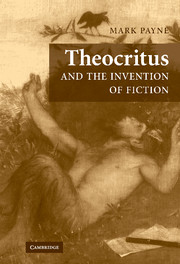2 - The presence of the fictional world
Published online by Cambridge University Press: 22 September 2009
Summary
This chapter looks at the fictionality of the bucolic world from the perspective of narrative mode; that is to say, whether that world is brought into being through the dramatic speech of its fictional characters, through narration by the poet, or through some combination of the two. By way of introduction to the discussion of this question in Theocritus, I consider the relationship between fictional presence and dramatic enactment in pre-Hellenistic poetry, in Hellenistic poetry other than the Idylls, and in ancient literary theory.
In an important discussion of “the mimetic poetic of Greek hymns,” Jan Maarten Bremer and William Furley have emphasized that the function of dramatic imitation in early cult hymns was to foster a sense of identity between the participants in the cult and the mythical beings their performance instantiated. Thus, for example, in the Cretan Palaikastro Hymn to Zeus armed warriors known as Kouretes reenact the rescue of the infant Zeus from his infanticidal father. Amid the clashing of cymbals (to drown out the cries of the baby), they address him as “the greatest Kouros,” describe the performance of their own hymn around his altar, and invite him to leap into (or for) their homes and fields. For the young Cretan men who perform the hymn, the reenactment of their ancestors through dramatic performance is a way to identify themselves with them, and so replicate in themselves the ideal of young manhood these ancestors represent.
- Type
- Chapter
- Information
- Theocritus and the Invention of Fiction , pp. 49 - 91Publisher: Cambridge University PressPrint publication year: 2007



